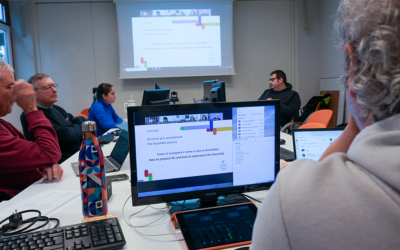 Environmental sustainability and energy. This was discussed at the EcoOne meeting, a cultural initiative born from the charism of the Focolare Movement in the world of ecology. The meeting took place at the Mariapolis Centre of Castel Gandolfo the 14th and 16th of May and was attended by fifty ecologists and professionals from Brazil, Chile, Portugal, Spain, France, Belgium, Germany, Austria and Italy.
Environmental sustainability and energy. This was discussed at the EcoOne meeting, a cultural initiative born from the charism of the Focolare Movement in the world of ecology. The meeting took place at the Mariapolis Centre of Castel Gandolfo the 14th and 16th of May and was attended by fifty ecologists and professionals from Brazil, Chile, Portugal, Spain, France, Belgium, Germany, Austria and Italy.
The subject was pondered by experts from various areas related to energy: from engineering to physics, from politics to sociology. University professors, industrial managers, scholars and experts discussed energy in nature, renewables, nuclear energy, climate change, political involvement and social solidarity which are all inherent to the energy issue.
A portion of the program was dedicated to examining the itinerary of EcoOne and the cultural elements that have characterized it since the first conference organized by Sergio Rondinara from Sophia University, ten years ago. “If the relationship between the human person and nature was harmonious in the past,” stated Luca Fiorani, ENEA researcher and coordinator of EcoOne, as she presented its work, “it has now led to an environmental crisis which is pointing to an even deeper anthropological and ethical crisis. Faced with this situation, the research plan of EcoOne is to uncover a new person-to-nature relationship which comes through recuperating the significance of each individual’s ties with nature. This is something that will take place on the level of our thinking in the religous sphere and in the rediscovery of pre-industrial traditions”.
“Let us pause and look at how far we’ve come on this path,” she continued: “We were joined by experts in the environmental field: professionals, academics and researchers from public institutions. This open and enriching cultural dialogue is not something decorative, but the very essence of EcoOne. We see that, over the years, a small body of ecologists with a well-defined point of view has been born within the Focolare Movement and is in dialogue with other professionals in the field. “
EcoOne has drawn up its own ecological thinking which is based on certain key elements: custodianship, which places the human person as the guardian of creation; responsibility and environmental awareness, that is, realizing that damaging nature means threatening life and this stimulates moral consciousness about environmental issues. A new person-nature relationship is needed, which can overcome anthropocentrism or physiocentric extremism. And finally the concept of sustainability, namely, the realization that “we need radical structural changes and behavioral development to be sustainable.”
“Man is not the center of the universe: God is.” These are words that Chiara Lubich wrote to the 2005 EcoOne Conference indicating that an ecological paradigm for human action would only be found in God who is Love.
Today her words have become the Magna Carta of EcoOne. “Let us not venture – Chiara continued – to go against God! We’ll find only death.if we do. If , instead, man’s goal becomes not economic interest, egoism, but love for others and the love of nature, then, with human help, the earth will be transformed and become an earthly paradise.”




0 Comments